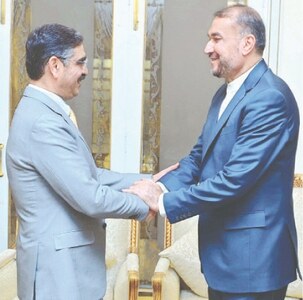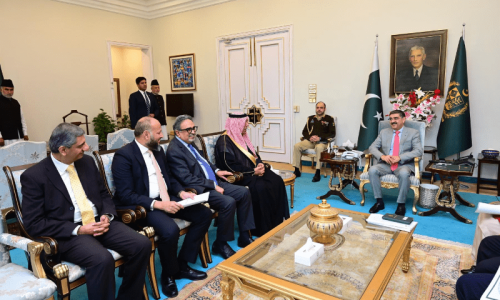ISLAMABAD: Emphasising the need for concerted efforts to explore onshore and offshore oil and gas reserves, caretaker Prime Minister Anwaarul Haq Kakar said on Tuesday the country has an abundance of natural resources to cater for domestic and industrial needs.
Speaking at the Petroleum Conference as the chief guest, the prime minister reaffirmed the government’s readiness to contribute to infrastructure development, logistics, and security to bolster oil and gas exploration and production efforts.
Chief of the Army Staff General Syed Asim Munir was the guest of honour at the conference, organised by the Ministry of Petroleum.
Mr Kakar said the conference reflected a collective commitment to fully utilise the immense mineral potential so as to ensure energy self-sufficiency and transform Pakistan into a regional exporter of energy.
Stresses need for reforms in criminal justice system
He appreciated the Special Investment Facilitation Council (SIFC) and the Federal Ministry of Energy for fostering an investor-friendly environment by streamlining regulations and procedures.
Country Manager of Kuwait Foreign Petroleum Exploration Company Ali Taha Al-Temimi appreciated efforts of the Pakistan government in bringing stakeholders together for formulating policy recommendations and boosting investment in the petroleum sector.
Provincial chief ministers, minister for energy, petroleum secretary, government representatives, policymakers, foreign and domestic investors from the energy and petroleum (E&P) sector and international delegates also attended the conference.
Criminal justice system reforms
Earlier, PM Kakar said in a private TV programme that under the Constitution, only parliament was mandated to legislate and stressed the need for reforms in the criminal justice system.
According to a press release of the Prime Minister’s Office (PMO), the prime minister said the conviction rate under the contemporary criminal justice system was very low, reflecting deficiencies and efforts needed to plug loopholes through effective legislation.
In reply to a question about terrorist groups in Balochistan, the prime minister said that non-state actors had no right to unleash violence and the state had the responsibility to counter such acts of terror.
He said that about 90,000 people had lost their lives in the country due to terrorism, asking was it not the onus of political parties and lawmakers to improve the criminal justice system to expedite the rate of conviction.
The prime minister said he was speaking about the entire justice system, especially its lower tiers.
“Whose responsibility is it to improve the system? Carrying out legislative business under the Constitution is the onus of the parliament,” he said.
Elaborating his viewpoint, he said that Baloch, Pashtuns and different settlers had been living in Balochistan for decades, adding that there is no political uniform group while one minority armed group was carrying out violent activities. Mr Kakar said the US, UK, EU and all other countries had declared these groups as terrorists.
He said he did not differentiate between banned TTP and Ahrar, BLA and BLF as all these terrorist outfits had been using violence as a tool to create terror and kill innocent people.
In their terrorist attacks, he said, 1038 people had been martyred since 2018 in the province and cited incidents of coastal highway and Turbat police station attacks in which innocent people were killed and burnt alive.
On the other hand, he said, political protests were acknowledged in the world by intelligentsia and media. The world has declared the militant Islamic State (IS) group a terrorist entity.
The prime minister said that the Middle East was a complex challenge and Pakistan has conveyed to the international community that continuation of the situation in Gaza was unacceptable. Along with Muslim countries, Pakistan has reaffirmed a joint stance, the prime minister said.
He said the Organisation of Islamic Cooperation (OIC), Arab League and the entire world was speaking about the two-state solution, with an independent Palestine state based upon pre-June 1967 borders, with Al Quds al Shareef as its capital, adding that it was the unanimous stance of the Muslim world.
He regretted that certain elements were criticising him unjustly for referring to that solution and reiterated that Pakistan had not budged from its principled stand on the Palestine issue.
He said his remarks about Quaid-i-Azam’s views over Palestine had been distorted in the past.
Published in Dawn, January 31st, 2024















































Dear visitor, the comments section is undergoing an overhaul and will return soon.